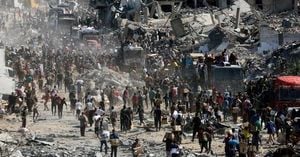On October 12, 2024, President Volodymyr Zelenskyy announced during his nightly video address to the nation, the resilience of Ukrainian forces stationed within Russia's Kursk region. Despite concerted efforts by Russian military forces to push back against Ukrainian positions, Zelenskyy reassured the public: “Russia tried to push back our positions, but we are holding the designated lines.” This statement provides insight not only to the Ukrainian military’s resolve but also the significance of the Kursk operation, which has now evolved since its initiation over two months ago.
The incursion, which began on August 6, 2024, has been described as historic; it marked the first time foreign troops have penetrated Russian territory since World War II. Following Ukraine's swift control of approximately 100 settlements and around 1,300 square kilometers (nearly 500 square miles) of the Kursk region, the dynamics of the battle have become increasingly complex. While Ukraine has maintained control over significant areas, reports indicate recent minor gains by Russian troops near the villages of Korenovo and Lyubimovka. Geospatial evidence has shown these advancements could potentially shift the tide yet again.
The current situation upholds varying degrees of worry among analysts and military observers alike. According to the Institute for the Study of War, Ukraine’s foothold now measures around 786 square kilometers (approximately 300 square miles). Commander Dmytro, known as “Kholod” among troops, noted the combat is “incremental,” emphasizing how advances are counterbalanced by Ukrainian counterattacks. This ebb and flow of territorial gains showcases the fierce nature of the struggle as each side fights over sandy villages and the strategic significance these locations bear for both their military efforts and home-front morale.
While Russian forces attempt to cement their gains, Moscow has mobilized about 40,000 troops to defend its border. Yet, analysts assert these forces began as somewhat improvised and made up of both conscripts and under-trained reservists. Senior fellow Mark Galeotti opined, "Moscow has since deployed more experience troops, yet still not sufficient resources on the ground, which have created discontent among civilians prompting more than 100,000 to evacuate their homes.”
Despite these challenges, Russian authorities continue to downplay the incident as “a simple raid,” seeking to mitigate the embarrassment of Ukraine’s advancing troops. A Russian military blogger put it bluntly, stating, “Most of Russia has already got used to the fighting near Kursk... Those who have nothing to do with the Kursk region are rather sluggishly interested.” This sense of normalization indicates how deeply the ramifications of this conflict have touched the Russian society and government structure. Instead of rallying full resources to respond decisively, the Kremlin's reaction has been to shift focus elsewhere within its sprawling war agenda, particularly the broader eastern front.
Behind the chaos and relentless turbulence of warfare lies the idea of narrative control. Experts speculate Ukraine's operation within Kursk serves multiple purposes. It highlights Russia’s perceived vulnerability, aimed at energizing Western support for Ukraine by demonstrating the potential limits of Russia's military capabilities. And as the Ukrainian President reiterated, this operation also seeks to draw Russian military focus away from front lines, especially areas like Donetsk and Zaporizhzhia, where fighting remains intense and relentless. “The situation is difficult,” Zelenskyy acknowledged, admitting the tremendous pressure being exerted against Ukrainian forces on those fronts.
Analysts predict the operation could yield negotiation advantages for Ukraine moving forward. By establishing territorial claims within Russia, Ukraine potentially secures its position at the bargaining table. The ultimatum is clear: both Russia and Ukraine cannot enforce significant changes without recognizing the altered dynamics of territorial control initiated back on August 6. Citizens of Ukraine have reacted to these developments with pride, celebrating such historic victories even against the backdrop of heavy losses. Many Ukrainians view the conflict as more than simple military engagement; it is seen as a struggle for their identity and existential autonomy.
Meanwhile, the conflict escalates with each passing day. Russian forces have upscaling their attacks across various fronts, particularly underlining the gravity of continued assaults on civilian areas. Just recently, reports emerged detailing two casualties following Russian attacks on the Donetsk region, sparking international concern over the conflict's toll on the civilian population. Elena, a local resident said, “The war isn't just about territory anymore; it's affecting everyone’s lives here.”
Despite calls for more Western assistance and immediate military supplies, Zelenskyy is aware of the urgency. He emphasized the necessity for rapid deliveries of air defense systems and long-range capabilities to the global community, reminding allies during his appeal: “Time must not be wasted.” Even as governmental bureaucracies tend to constrain the transfer of military equipment, the stakes rise higher as the situation on ground grows dire. With Russia's recent drone attacks emphasizing the push against Ukrainian cities, Kyiv is getting desperate.
Having captured villages such as Ostrivske, the Ukrainian defense is now refocusing strategically, aiming to secure regions against bombardment and potential crosses by Russian troops. The desire to stabilize positions both within Ukraine and along its borders is central to their battle strategy, proving fundamental as they confront military disadvantages elsewhere.
While the war between these two nations threatens Eastern European stability, evidence suggests this incursion may play pivotal for both sides, upholding its weight across geopolitics within the region and beyond. Analysts uncertainty looms about what future negotiations could emerge, and how control of the Kursk region might redefine military stratagems as scenarios progress.
It is evident from the dynamics of this conflict, each side is methodically pursuing its agenda. Ukraine doesn’t plan to relinquish its hard-won positions easily, and it seems Russia is not yet ready to cede ground either. The potential outcomes remain uncertain, leaving open questions about military tactics, territorial integrity, and national foreboding over what tomorrow may bring.
This battle highlights how conflicts evolve and adapt; factors beyond mere territorial exchange forever change the essences of nations involved, illustrating the volatile nature of warfare and the underlying stories it tells. Amidst the rubble and clash of gunfire, the struggle for identity, autonomy, and hope continues to resonate.



